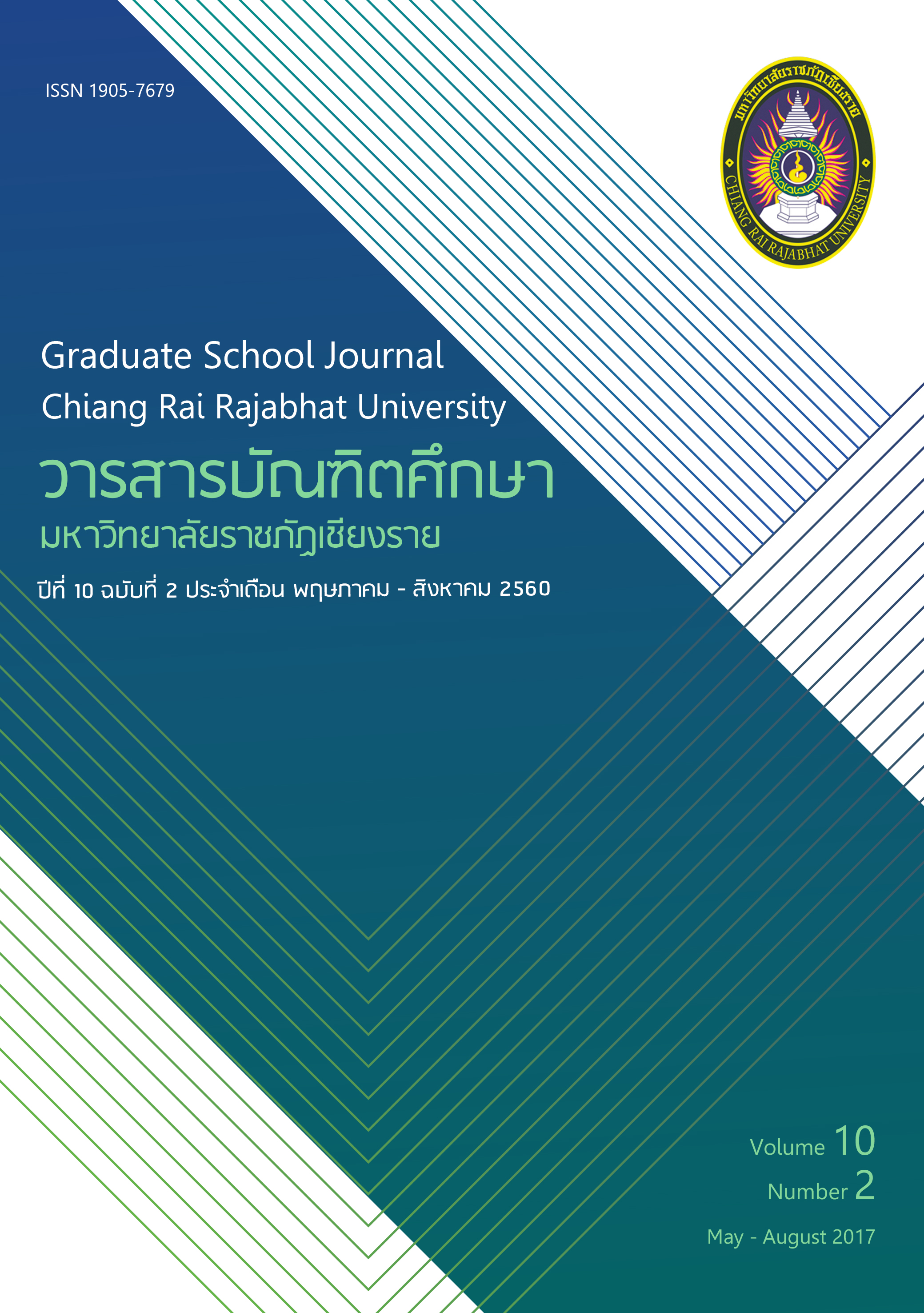แนวทางการขับเคลื่อนคุณธรรมจริยธรรมของเด็กและเยาวชนในจังหวัดเชียงราย
Main Article Content
บทคัดย่อ
การวิจัยครั้งนี้มีวัตถุประสงค์เพื่อศึกษาสภาพปัญหาคุณธรรมจริยธรรมและแนวทางการขับเคลื่อน
คุณธรรมจริยธรรมของเด็กและเยาวชนจังหวัดเชียงราย ประชากรที่ใช้ในการวิจัยครั้งนี้ ได้แก่ พระสงฆ์ระดับ
ครูพระสอนศีลธรรมในโรงเรียนทุกอำเภอ อำเภอละ 1 รูป จำนวน 18 รูป 18 อำเภอ ครูผู้สอนกลุ่มสาระ
การเรียนรู้สังคมศึกษา ศาสนาและวัฒนธรรม ทุกอำเภออำเภอละ1 คน จำนวน 18 คน 18 อำเภอ เจ้าหน้าที่
สำนักงานพุทธศาสนา จำนวน 3 คน เจ้าหน้าที่สำนักงานวัฒนธรรมจังหวัดเชียงราย จำนวน 3 คน และ
ผู้ปกครอง ผู้นำชุมชน จำนวน 7 คน เจ้าหน้าที่ศาลเยาวชนและครอบครัวจังหวัดเชียงราย จำนวน 1 คน
รวมทั้งสิ้น 50 คน เครื่องมือที่ใช้ในการวิจัยได้แก่ แบบสัมภาษณ์ แบบสังเกตการณ์ แบบสอบถาม สถิติที่ใช้
คือ ค่าร้อยละ ค่าเฉลี่ย และค่าความถี่ ผลการวิจัยพบว่า
เด็กและเยาวชนในจังหวัดเชียงรายมีความรู้ความเข้าใจบ้างในเรื่องของศีลธรรมและการมีคุณธรรม
และจริยธรรมที่สามารถนำไปประพฤติปฏิบัติได้แต่ไม่ดีเท่าที่ควร จึงทำให้เด็กและเยาวชนมีปัญหาด้านต่างๆ
คือ ด้านศีลธรรม ด้านสังคมและวัฒนธรรม การประพฤติทางกาย การประพฤติทางวาจา การประพฤติทาง
จิตใจ และการเปลี่ยนแปลงที่รวดเร็วของสังคมและวัฒนธรรมมีผลกระทบต่อพฤติกรรมและการปฏิบัติตัวของ
เด็กและเยาวชนทั้งด้านดีและไม่ดี ด้านดี พบว่า มีการใช้เทคโนโลยีใหม่ๆ มาเป็นเครื่องมือช่วยเสริม
ในการดำเนินชีวิตประจำวัน ใช้ในการสื่อสารและเพิ่มประสิทธิภาพในการศึกษา ด้านไม่ดี พบว่า จะใช้เครื่อง
อำนวยความสะดวกไปในทางที่ผิดวัตถุประสงค์ เช่น การขับขี่ยวดยานพาหนะด้วยความประมาทคึกคะนอง
และการแต่งกายที่ล่อแหลมในเยาวชนหญิง การใช้คำพูดกับผู้ใหญ่ รวมไปถึงการเสพสิ่งเสพติดชนิดต่างๆ
อีกทั้งยังการมีเพศสัมพันธ์ก่อนวัยอันควรทั้งเยาวชนหญิง-ชาย และการใช้เครื่องมือสื่อสารในทางที่ไม่ถูกไม่ควร
แนวทางในการขับเคลื่อนให้เด็กและเยาวชนมีคุณธรรมจริยธรรม พบว่า ทุกฝ่ายต้องร่วมมือกันช่วยกัน
ในการขับเคลื่อน ทั้ง 3 สถาบัน คือ สถาบันครอบครัว สถานศึกษา และสถาบันศาสนา โดยเฉพาะสถาบัน
ครอบครัวสำคัญที่สุดที่จะขับเคลื่อนให้เด็กและเยาวชนที่อยู่ในความปกครองให้มีคุณธรรมจริยธรรม
โดยการปลูกฝังตั้งแต่เด็กๆ เน้นให้การศึกษามีความรู้และมีคุณภาพ สมรรถภาพ เป็นคนดีของสังคม เพื่อให้
เด็กและเยาวชนใช้ชีวิตอยู่ร่วมสังคมอย่างมีความสุขและผู้ใหญ่ต้องช่วยกันสอดส่องดูแลให้คำแนะนำเมื่อเด็ก หรือเยาวชนมีปัญหาโดยไม่เลือกที่รักมักที่ชังและผู้ใหญ่ก็ต้องทำตัวให้เป็นแบบอย่างแก่เด็กและเยาวชนด้วย
ข้อเสนอแนะ
ข้อเสนอแนะเชิงนโยบาย
รัฐควรสนับสนุนการแพร่กระจายคุณธรรมในสังคมด้วยการยกย่องคนดีมีคุณธรรม การเป็น
แบบอย่างที่ดีของบุคคล ได้แก่ พ่อ แม่ ผู้ปกครอง ผู้นำประเทศ นักการเมือง ผู้นำทุกองค์กรทั้งภาครัฐและเอกชน
ผู้นำชุมชน ผู้นำองค์กรศาสนา โดยเฉพาะกลุ่มศิลปิน นักแสดง นักร้องที่เยาวชนชื่นชอบ จะเกิดการ
เลียนแบบ ควรสรรหาศิลปิน นักแสดง นักร้องที่มีคุณธรรมมายกย่องเชิดชูก็จะช่วยให้เยาวชนได้ต้นแบบที่ดี
ในการปฏิบัติตนที่ดีของชุมชนสังคมไทย ควรเสริมแรงด้วยการส่งเสริมให้กำลังใจและให้รางวัลแก่คนดี
มีคุณธรรม โดยหน่วยงานและทุกฝ่ายที่เกี่ยวข้องต้องส่งเสริมสนับสนุน ให้เกียรติ ให้กำลังใจ และปกป้องคนดี
มีคุณธรรมด้วยการมีกิจกรรมการทำความดีในระดับชุมชนจนถึงระดับชาติ
ข้อเสนอแนะเชิงปฏิบัติ
สถาบันครอบครัวควรสร้างบรรยากาศของบ้านที่อบอุ่น มีความเอื้ออาทร ความไว้วางใจ การยอมรับ
ตลอดจนการช่วยเหลือเกื้อกูลกัน เป็นการฝึกให้บุตรหลานมีความรับผิดชอบ มีวินัย ดูแลตนเอง บ้านและ
บุคคลในครอบครัว ได้แก่ พ่อ แม่ ผู้ปกครอง ประพฤติตนเป็นแบบอย่างที่ดี มีความซื่อสัตย์ ขยัน อดทน ฯลฯ
ประพฤติตนตามหลักคำสอนของศาสนาและร่วมกิจกรรมของสถาบันทางศาสนาและสถาบันการศึกษาของ
บุตรหลานอย่างใกล้ชิดและต่อเนื่องเพื่อร่วมกันปลูกฝังคุณธรรมให้เกิดขึ้นกับบุตรหลานและเยาวชน
Article Details
บทความที่ได้รับการตีพิมพ์เป็นลิขสิทธิ์ของวารสารมหาวิทยาลัยราชภัฎเชียงราย
ข้อความที่ปรากฏในบทความแต่ละเรื่องในวารสารวิชาการเล่มนี้เป็นความคิดเห็นส่วนตัวของผู้เขียนแต่ละท่านไม่เกี่ยวข้องกับมหาวิทยาลัยราชภัฎเชียงราย และคณาจารย์ท่านอื่นๆในมหาวิทยาลัยฯ แต่อย่างใด ความรับผิดชอบองค์ประกอบทั้งหมดของบทความแต่ละเรื่องเป็นของผู้เขียนแต่ละท่าน หากมีความผิดพลาดใดๆ ผู้เขียนแต่ละท่านจะรับผิดชอบบทความของตนเองแต่ผู้เดียว
เอกสารอ้างอิง
ของสํานักงานคณะกรรมการวัฒนธรรมแห่งชาติ. กรุงเทพฯ: กระทรวงฯ.
ถามวัตร สีเขียว. (2557). น่ารู้ คู่ศาล. วารสารข่าวสารเยาวชนและครอบครัวจังหวัดเชียงราย, 9(95), 11.
ประมวล รุจนเสรี. (2542). การบริหาร-การจัดการที่ดี (Good Governance). กรุงเทพฯ:
อาสารักษาดินแดน.
พิทยา ว่องกุล และคนอื่นๆ. (2546). การศึกษาทางเลือก : การศึกษาที่นำไปสู่อิสรภาพ. ใน ปฏิวัติการศึกษา
ไทยแก้ปัญหาฆาตกรรมทางจิตวิญญาณ (หน้า 3). กรุงเทพฯ: อัมรินทร์พริ้นติ้งแอนด์พับลิชชิ่ง.
พิศาล แช่มโสภา. (2539). คู่มือการพัฒนาจริยศึกษา. กรุงเทพฯ: โรงพิมพ์การศาสนา.
มหาวิทยาลัยอัสสัมชัญ. สำนักวิจัยเอแบคโพลล์. (2556). รูปแบบการดําเนินชีวิตของเยาวชน “จากอดีต
สู่ปัจจุบัน”. สืบค้นเมื่อ 26 มกราคม 2556, จาก http://www.abacpoll.com
ศีลธรรม โพนนะทา. (2546). การพัฒนาคุณธรรมจริยธรรมของนักเรียนระดับมัธยมศึกษาตอนต้น
โรงเรียนบ้านโนนค้อ อําเภอคําม่วง สํานักงานเขตพื้นที่การศึกษากาฬสินธุ์ เขต 3.
(การศึกษาอิสระการศึกษามหาบัณฑิต). มหาวิทยาลัยมหาสารคาม. มหาสารคาม.
สำนักนายกรัฐมนตรี. สำนักงานคณะกรรมการส่งเสริมและประสานงานเยาวชนแห่งชาติ. (2536).
ประมวลสรุปผลงานวิจัยเกี่ยวกับเด็กและเยาวชนในประเทศไทย. กรุงเทพฯ: สำนักฯ.
สุรเดช สำ
ราญจิตต์. (2552). ความเชื่อที่ผิดเกี่ยวกับสุขภาพของครูระดับประถมศึกษา
เขตการศึกษา 12. (วิทยานิพนธ์การศึกษามหาบัณฑิต). มหาวิทยาลัยศรีนครินทรวิโรฒ
ประสานมิตร. กรุงเทพฯ.


